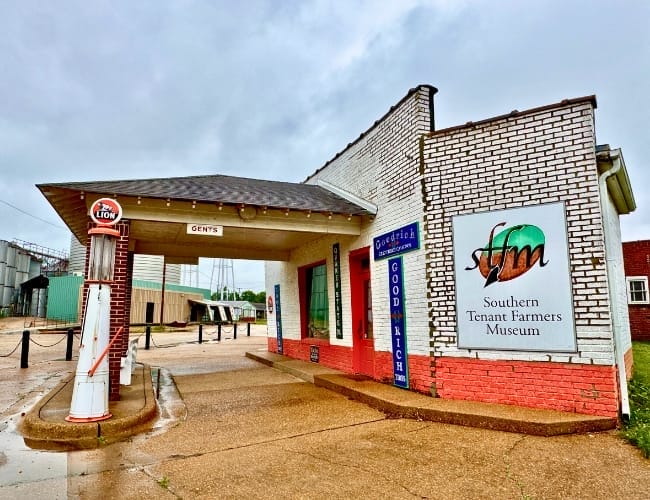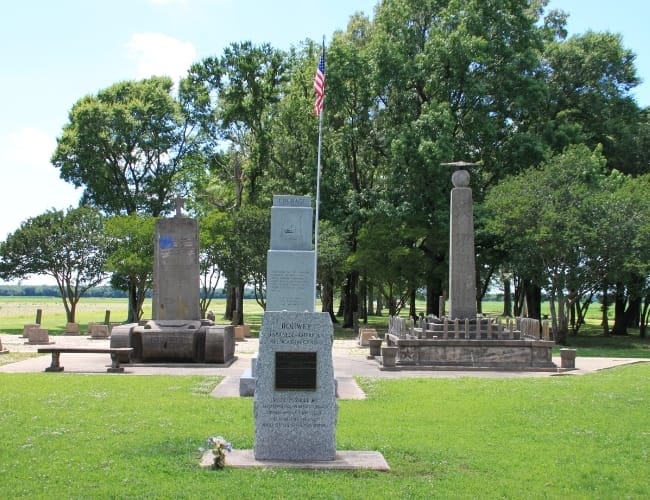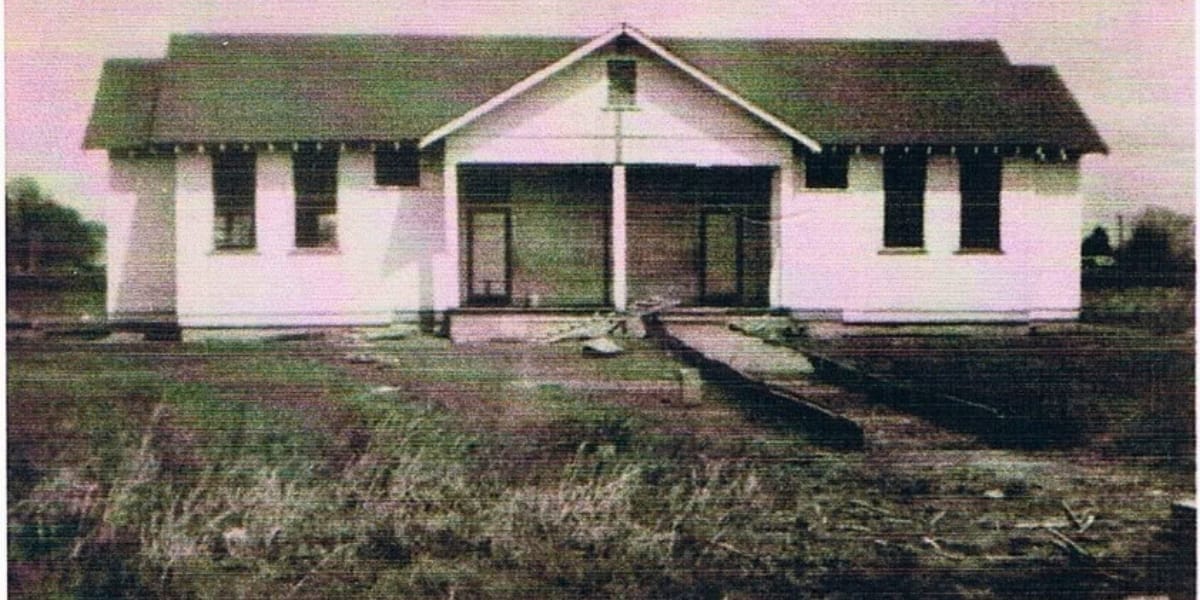

Uh oh...
It appears that you're using a severely outdated version of Safari on Windows. Many features won't work correctly, and functionality can't be guaranteed. Please try viewing this website in Edge, Mozilla, Chrome, or another modern browser. Sorry for any inconvenience this may have caused!
Read More about this safari issue.

From cotton fields to cultural icons, literary legends to civil rights pioneers, the stories of Arkansas endure through the state’s extraordinary heritage sites. Spread throughout the Arkansas Delta and lovingly maintained by Arkansas State University’s Arkansas Heritage Sites Program, these destinations invite you to step into the past and appreciate the individuals and movements that shaped Arkansas and the American experience.
Whether you’re a history enthusiast, road trip lover, student or curious traveler, these sites provide engaging tours, hands-on education and unforgettable experiences.

East Arkansas Heritage Sites
This collection of award-winning destinations, all situated in the Arkansas Delta, showcases the voices, struggles, and achievements of rural Arkansans. Each property provides guided tours, special events and opportunities for reflection and learning.
Southern Tenant Farmers Museum | Tyronza
Located in the historic Mitchell-East Building in Tyronza, this museum honors the interracial Southern Tenant Farmers’ Union, founded in 1934. It was one of the first organizations in the South to advocate for the rights of Black and white tenant farmers, serving as a powerful example of advocacy and leadership within Southern communities.
Exhibits depict the union’s impact on labor reform, civil rights history, and activism during the New Deal era. The restored building once housed the dry goods store and doctor’s office where union organizing began. Visitors can explore interpretive displays, period artifacts, and oral histories in a miniature theater that brings the struggles and triumphs of Arkansas’s working class to life.
870-487-2909 | stfm.astate.edu

Dyess Colony and Johnny Cash Boyhood Home | Dyess
Step back in time to one of America’s largest New Deal agricultural resettlement communities. The Dyess Colony, established in 1934, provided struggling families with a fresh start through cooperative farming. Among those families was the Cash family, and today, the restored Johnny Cash Boyhood Home narrates the story of young J.R. Cash’s formative years in Dyess, the preservation of family, and a better understanding of tenant farming.
Visitors can explore the Dyess Colony Administration Building, which features exhibits on the New Deal program and life in the Dyess community. From there, they can head just a few miles down the road to tour the modest five-room home where the Man in Black learned about music, resilience, faith and hard work. Restoration efforts have returned the house to its 1930s appearance, showcasing family artifacts and furnishings from the Cash era.
870-764-2274 | dyesscash.astate.edu
Historic V.C. Kays House | Jonesboro
Once the residence of Victor Cicero Kays, the founding president of Arkansas State University, this beautifully restored Craftsman-style home provides a glimpse into early higher education and community leadership in northeast Arkansas. Built in 1911, the house is preserved with period-appropriate interiors and features rotating exhibits related to the university’s legacy.
Today, the home also serves as a venue for visiting scholars, educational programs, and public events that connect the academic history of A-State with the broader narrative of Arkansas innovation.
870-972-2803 | heritagesites.astate.edu
Hemingway-Pfeiffer Museum and Educational Center | Piggott
Literature lovers will appreciate this site in Piggott, where Ernest Hemingway spent time writing parts of “A Farewell to Arms.” The property includes the restored barn studio where Hemingway worked, as well as the home of his in-laws, Paul and Mary Pfeiffer.
Guided tours emphasize Hemingway’s ties to Arkansas and showcase the region’s distinct literary heritage. Visitors can also view original furnishings, family artifacts and participate in writing retreats and literary events throughout the year. It is a writer’s dream and a spot to contextualize literature.
870-598-3487 | hemingway.astate.edu

Rohwer Japanese American Relocation Center | Rohwer
As one of the few remaining Japanese American internment camp sites from World War II, the Rohwer Memorial Cemetery and Interpretive Center recounts the challenging story of the 8,000 Japanese Americans who were forcibly relocated and imprisoned here between 1942 and 1945.
Though few original structures remain, the preserved cemetery and interpretive panels provide a sobering look at civil liberties during wartime. Audio kiosks, partially funded by actor George Takei (himself a former Rohwer internee), enable visitors to hear first-person narratives from survivors.
870-222-9168 | rohwer.astate.edu

Lakeport Plantation | Lake Village
One of the best-preserved antebellum homes in Arkansas, Lakeport Plantation provides a profound and honest insight into plantation life before and after the Civil War. Located along the banks of the Mississippi River, the 1859 house was meticulously restored to its original Greek Revival splendor. The front lawn is one of the most enchanting spots on a summer evening.
Guided tours explore the architecture, family history, and experiences of the enslaved individuals who lived and worked there. The home features interpretive exhibits on transforming the Southern economy and society through emancipation and reconstruction. While occupied during the Civil War, this home endured because it was neither burned nor disturbed, unlike many others.
870-265-6031 | lakeport.astate.edu
Heritage Studies Program at Arkansas State University
Arkansas State’s interdisciplinary Heritage Studies Ph.D. program actively contributes to the preservation, research, and interpretation of these sites. Graduate students and faculty are involved in public programming, interpretive exhibits and community engagement throughout the Delta. This collaboration ensures that the sites are not only preserved but also remain relevant to today’s audiences. Students in the program gain practical experience in museum studies, history, and cultural preservation. Learn more about the Heritage Studies program
Many of these historic properties are situated within the Arkansas Delta Byways region, a National Scenic Byway that showcases the culture, music, foodways, and natural beauty of eastern Arkansas. Consider this designation as your road trip route to explore Delta blues markers, scenic farmland and unforgettable stops. The Delta Byways offer easy access to heritage sites, connecting visitors with local dining, festivals, and nature-based tourism in the surrounding communities.
Arkansas’s heritage sites do more than preserve old buildings. They amplify stories that still matter today—stories of survival, creativity, injustice and reform. A trip to any of these destinations will leave you informed and inspired. Many Arkansans travel to the 30A area along the Florida-Georgia borders and stop at places like Lakeport or Rohwer, which are easy destinations to include in your road trip. Get ready to walk where history lives in the Arkansas Delta.
Join the Conversation
Leave a Comment
2 responses to “Living Legacy at A-State Heritage Sites”
 Leave a Reply
Leave a Reply
We do the work.
You check your email.
Sign up for our weekly e-news.
Get stories sent straight to your inbox!












 Leave a Reply
Leave a Reply
[…] and you can follow his footsteps at the Johnny Cash Boyhood Home and Dyess Colony Cultural Center. Restored to its 1930s appearance, the Cash home offers an up-close look at the humble beginnings of one of America’s most […]
[…] Museum State Park on the town square, or take a scenic drive through nearby Delta communities to visit preserved historic sites and landscapes that tell the story of this […]